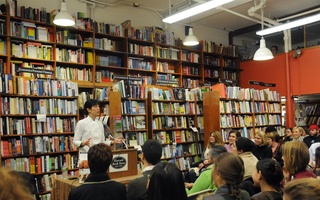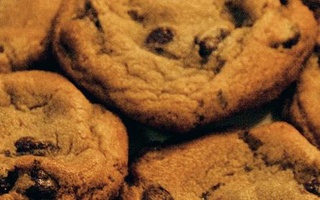Largely self-taught, Pan comes from a Chinese family of accomplished cooks and says she was inspired to try dessert-making because of the relative lack of a dessert tradition in Chinese food culture. “I ended up improvising a lot, and I think this improvisation has helped my baking,” she says. Dessert-making also allows Pan to reconcile two different aspects of her personality. “With baking, a lot comes down to the science and the proportions…. I have a rational, scientific side, and a creative, improvisational side, and baking lies at that intersection.”
FEEDING COMMUNITY
But the appeal of dessert-making isn’t just frosting-deep. At the Dudley Co-op, student bakers use their craft to help foster a sense of togetherness among the Co-op’s roughly 35-student population.
When I meet Matthew E. Stolz ’14 at the Co-op, his hair is tied back in a bandana and he's still wearing an apron from making that evening's dinner. Stolz takes a break from the bustle of the meal to greet me. "First of all,” he says, “Can I get you something to eat?"
After politely declining, I sit down with Stolz to talk dessert. Stolz learned to cook by making two meals a day, five days a week at Deep Springs College, a renowned alternative liberal arts school located in California. Stolz attended Deep Springs for two years before before transferring to Harvard. Meals Stolz prepared at Deep Springs included potatoes grown on campus, cow's brain soup, and tongue tacos ("People love them!"), made from Deep Springs' own cows. In comparison, making food for the Co-op's residents seems like, well, a piece of cake.
{shortcode-8de91746a87630b103956e5716b135df004df5b6}
“When we did French pastries [at Deep Springs] we stayed up to 4 a.m. working on them. We'd rather bring sleeping bags to the kitchen than go back to our rooms,” Stolz says. “There were times I was cooking seven hours a day, even getting behind on my schoolwork.” Today, Stolz works hard to make his meals at the Co-op cohesive and tasty. "I don't really distinguish between cooking and baking,” he says. “For me, it's about making a whole menu…all the way down to the dessert at the end. Sometimes that doesn't happen—but you have to reach for the light of the ideal."
Matthew C. Plaks ’14, another resident of the Co-op, credits the lifestyle of the Cooperative with enabling him to develop an interest in the culinary arts while at Harvard. The students living in the Co-op share the cost of buying food and take turns preparing meals. "Harvard isn't very conducive to getting people to realize they are interested in [baking] as a career,” Plaks says. “Personally, if I wasn't already paying dues to the Co-op, I wouldn't have had the funds to pursue this at the level that I am.” “This,” for Plaks, is bread-baking, a pastime that he delved into wholeheartedly after he moved to the Co-op last fall and baked his first loaf.
“The reason I love bread baking is that bread is really a good anchor, or actor even, in creating community,” Plaks says. “I realized people would drop what they were doing as the smell of the bread [pulled] them into the room." In order to hone his bread-baking skills, Plaks pored over instructional videos and the commentary sections of cookbooks, even emailing renowned bread bakers for their tips. When we meet, he tells me about the series of precise creative decisions that go into making a bread, such as choosing the type of fat and considering the volume of liquid.
Closely attentive to subtle differences among breads, Plaks speaks of sweet breads with hints of lemon, of crusts that reach a deep mahogany brown, of nuances in sandwich loaves and flours. He echoes the opinions of Yeh, Ferrante, and Pan, pointing to the importance of creating a dessert that is as visually appealing as it is tasty. "Aesthetics are a big part of the final product. Of course it's good if it tastes great, but [it’s] even better if it looks nice. It's one thing to make food that nourishes and sustains you, but it's another to have a level of refinement." As a VES concentrator who works primarily with photographs and videos, Plaks sees a qualitative difference between his work in these media and his culinary work. "Bread-baking is a much more intuitive and tactile and sensory experience [than video], so it's really nice to have that expression and sensation."
VIRTUAL SWEETNESS
Read more in Arts
"Salomé" Loses Its HeadRecommended Articles
-
 Joanne Chang, Owner of Flour Bakery, Shares Culinary Expertise
Joanne Chang, Owner of Flour Bakery, Shares Culinary Expertise -
 Cookies for a Cause
Cookies for a Cause -
Alleged Rapes Prompt ConcernLast month’s two sexual assaults, the first reported cases of stranger rape on the Harvard campus in 12 years, loomed over this academic year’s move-in.
-
UC Approves Budget, Elects New SecretaryFew changes were made to this year’s budget, but the Council did debate how to allocate additional funds it will receive in revenue.













